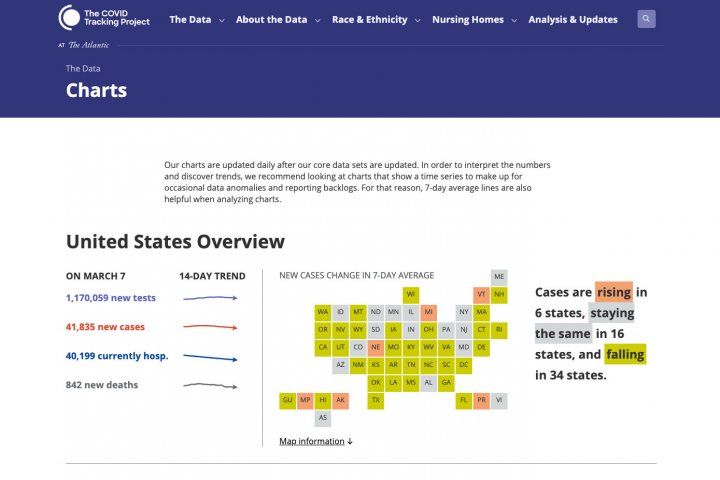UCSF to House COVID Tracking Project, a National Database Donated by The Atlantic
“Citizen-Science” Pandemic Record Is Available to Researchers and General Public

The COVID Tracking Project – a 15-month endeavor, powered by volunteers, to catalog statistics throughout the U.S. related to the pandemic – will become part of UCSF’s permanent library collection.
UC San Francisco and The Atlantic have announced that the COVID Tracking Project, a crowdsourced digital archive documenting the face of the pandemic in the United States, will become part of the University’s permanent library collection and is accessible to researchers and the public.
The project was a 15-month endeavor, powered by volunteers, to catalog statistics throughout the U.S. related to the pandemic in the face of limited data amid an urgent need to better understand the pandemic and protect the public.
“The Atlantic COVID Tracking Project is an inspiring example of a citizen crowdsourcing initiative that enabled democratization and transparency of science communications for the benefit of society,” said Polina Ilieva, Associate University Librarian for Collections, who oversees Archives and Special Collections kept by the University.
The project, launched by The Atlantic to fill a gap in reliable information about the pandemic, consisted of about 500 volunteers who compiled and published data on COVID-19 testing, cases, hospitalizations, and deaths in the U.S. The data were cited by major journals and more than 7,700 news stories and used by the Centers for Disease Control and Prevention, the U.S. Department of Health and Human Services, and the federal Food and Drug Administration.
Ilieva called it a one-of-a-kind collection and noted that it is the first “citizen science” project – in which volunteers from the general public contribute to the process – to become part of the UCSF archives. “It documents crowdsourcing science activities and will enable researchers to review the grass roots collaboration as it was happening in real time,” she said.
Alexis Madrigal, one of the co-founders of the project and a contributing writer to The Atlantic magazine, said that the project took on an unexpected life of its own. “From its inception, this project was both unlikely and unprecedented: No one expected a volunteer pop-up collective to publish and interpret public health data for the United States for the first year of a global pandemic,” wrote Madrigal, who is also a host of KQED’s Forum, and project co-founder Erin Kissane earlier this year.
The project was originally conceived as a short-term undertaking, but quickly became an important source of information for journalists and health researchers. It is a vital part of the UCSF COVID-19 archival collection, said Ilieva, and will augment official university records from that time period.
In addition, she said, the collection inspires a reimagining of the preservation of history. “This project provides impetus for developing tools and new approaches for archiving collections, comprising diverse formats from instant messages to source code to emails as well as data sets,” Ilieva said.
The archive was created in conjunction with the California Digital Library and Dryad, an open-source data infrastructure. It joins other publicly-accessible UCSF archives on the tobacco industry, the opioid industry, and the food industry, which are used widely by researchers across the globe.
Ilieva said she plans to encourage UCSF faculty to draw on this archive in the same way. “We are excited to serve as a repository for this distinctive collection that documents how non-traditional scientific communities collaborate, develop infrastructure, and engage with public and state officials to foster dialog and transparency,” she said.